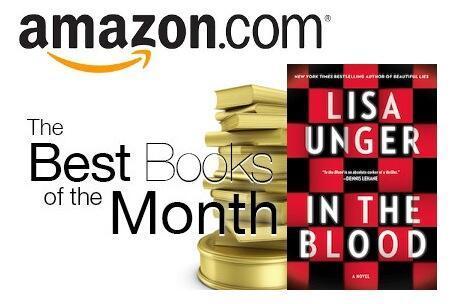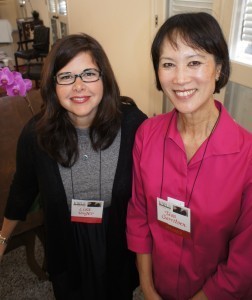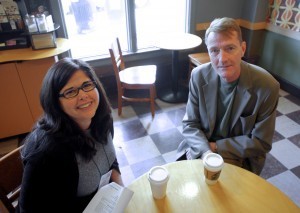Lisa Unger's Blog, page 14
April 2, 2014
The Strand Magazine Interview
In this in-depth interview with The Strand Magazine (Spring 2014 Issue), I talk about the inspiration for IN THE BLOOD, publishing, the craft of writing and advice for writers.
March 26, 2014
Wonderful Evening with Jonathan Santlofer
It was a wonderful evening with Jonathan Santlofer at the Manhattan Center For Fiction talking about the craft, the business and IN THE BLOOD.
March 20, 2014
The Center for Fiction – Masters Class
New York City pals! Come chat with me about craft, process and getting published at The Center for Fiction Tuesday, March 25th at 7 PM. I love talking about the journey from aspiring to published and everything in-between … and beyond. This is a free event, open to the public, and seats are still available.
RSVP HERE
About CMA at The Center for Fiction
The Crime Fiction Academy is the first ongoing program exclusively dedicated to crime writing in all its forms. Students are taught by successful practitioners of the genre, and classes take place in The Center’s eight-story building at 17 E. 47th Street in Manhattan. Every writer enrolled in CFA attends a 12-week Writing Workshop, one private Master Class each month, and a Crime Fiction Reading seminar. In addition, each writer has access to special lectures and discussions with editors and agents from the world of crime fiction publishing, round-the clock membership in The Center’s Writers’ Studio, free admission to all Center for Fiction events, and access to the Center’s extensive circulating collection, which won a Mystery Writers of America Raven Award for its amazing in-depth collection of crime fiction.
March 10, 2014
Thrill Ride
I have been on a thrill ride for as long as I can remember. I’ve read wildly, across genre, never discriminating. I love a big, character-rich story with a dark heart, with a compelling mystery or some kind of ticking clock at its center. I want to be lured in by prose, captured by character, and bound by stellar plotting to keep turning the pages. In short, I want thrills. Of course, thrills can be found in any “genre.” Here are some of my all-time favorites:
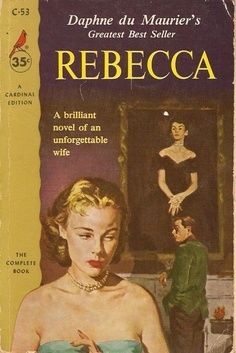
Rebecca by Daphne Du Maurier
I read Rebecca when I was a teenager and was swept away by the powerful voice, the gut wrenching suspense and the dark, twisted love story at its center. A young girl meets a tragic and dashing man while she’s on holiday in Italy, and they enter into a whirlwind romance. They quickly marry, and she returns with Maxim de Winter to Manderley, his home on the Cornish coast. It should be a fairy tale. But once there she finds herself “haunted,” in a sense, by the memory of Maxim’s first wife Rebecca.
Stalked by phantoms of Rebecca’s memory in every room (preserved by the spooky and intimidating housekeeper Mrs. Danvers), the second Mrs. de Winter is determined to uncover the shocking truth of predecessor’s life — and her death. From page one, I was hooked, transported into the narrator’s gothic world. For me, there was something gripping about an ordinary girl being drawn into a nightmare (a theme I find again and again in my own work.) I’ve been addicted to big stories like this ever since.
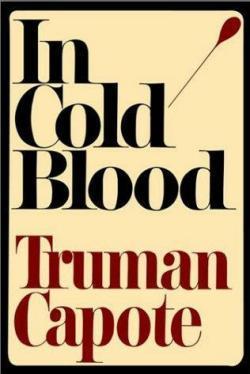
In Cold Blood by Truman Capote
In Cold Blood is not a thriller at all, really. It is, however, the first work of its kind: a true crime book that reads like fiction. And that is certainly thrilling. It’s an absolutely engrossing, gorgeously written account of the brutal murder of a Kansas family with a psychological profile of their killers.
Truman Capote was a magical, beautiful writer. I had already fallen in love with the colorful characters and stunning prose of his other work. But In Cold Blood was formative for me as a writer of crime fiction. It made me realize that one could write about the darkest and ugliest things and do so with great compassion and beauty. It took me deep into dark places and told me that it was okay to look.
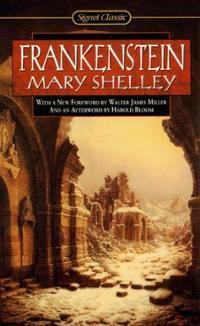
Frankenstein by Mary Shelley
The story behind the book is almost as fascinating as the tale itself. Mary Wollstonecraft Godwin (later Shelley) was just 18 years old in 1816 when she and Percy Bysshe Shelley visited Lord Byron and spent a dreary summer trapped indoors by inclement weather. (Actually it was a volcanic winter caused by the eruption of Mount Tambora! Imagine!)
Because of the many film adaptations, most of us think we know the story: Dr. Frankenstein, obsessed with reanimation, creates a monster, which he then abandons. I picked it up wanting to be scared silly by a monster story. I held an image of a square-headed, neck-bolted monstrosity, his body patch-worked from corpses, his brain belonging to an executed criminal. He was hell-bent on destruction.
But instead of a monster story, in Frankenstein I found a sad, beautiful novel about the nature of the human heart. The gripping narrative and its large themes — ambition, alienation, science, the origins of life, fear of technology — mesmerized me. I had hoped to be frightened, thrilled, white-knuckled — and I certainly got what I came for. But I hadn’t expected to think, or to feel so deeply for the tortured creature and his wretched creator.
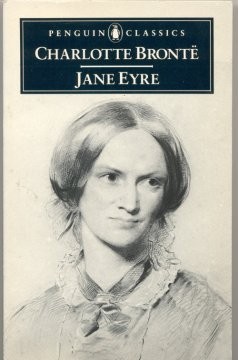
Jane Eyre by Charlotte Brontë
Don’t tell me that this is not a thriller — and a dark, twisty romance, a fascinating mystery, a coming of age novel. Jane Eyre, an orphan abused by the aunt who took her in and at the orphanage where she was finally sent, comes to Thornfield Hall as a French tutor to young Adele. But the owner of the estate and Adele’s guardian Mr. Rochester is strangely absent. Out for a walk one evening she finally meets her gruff and mysterious employer. Eventually, a romance blossoms between Jane and Rochester. But, of course, Mr. Rochester has a dark and terrible secret. (How could he not? We are talking about thrillers here, people.)
Hmm … here we are again. Ordinary girl caught in a huge gothic plot — secrets, lies, a haunting past, a confounding mystery, drama, fire! It’s one of those books that I can read again and again, because the story is simple but rich, the characters are deep and layered. And the thrills are endless.
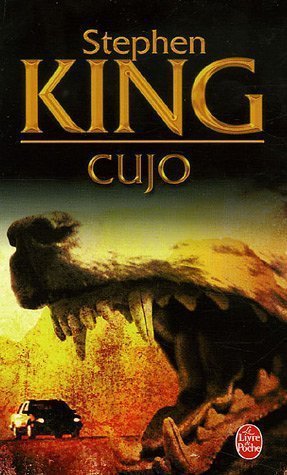
Cujo by Stephen King
Stephen King is one of my all time favorite writers and I’ve read most of his novels. He never fails to make it onto my must lists, an absolute master of all the things that make novels compelling. I usually mention The Shining or Salem’s Lot, but Cujo is definitely a book I never forgot, because it was the first book that really scared me. I was nine or maybe 10 when I read it — which frankly is way too young. I wouldn’t dream of letting my daughter read this gripping, terrifying, pulse-pound thriller. I was absolutely petrified but unable to stop reading this story about a woman and her young son trapped in their Pinto on a hot summer day being terrorized by a rabid St. Bernard named Cujo.
King claims to have written this in a drunken haze. I re-read the book recently, and it’s certainly not his most accomplished outing. But there are scenes that have stayed with me my whole reading life. It’s King’s intense writing style (you can feel the heat in that car), and how he gets deep into character (even poor Cujo), that make it one of my favorite thrillers.
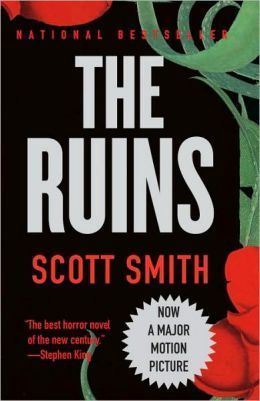
The Ruins by Scott Smith
In his 2008 novel The Ruins, Scott Smith created one of the most darkly frightening thrillers I have ever read. When two couples head to Mexico for a week of fun and sun, they can’t resist a bus trip out to rural Yucatan (a.k.a., the middle of nowhere) to visit the site of an archaeological dig. In spite of numerous signs that the excursion is a bad idea (including a little boy who acts as a spooky sentinel, not to mention a group of armed adults warning them away), the foursome forges on.
It’s not long before they find themselves trapped on the site that has been grown over by mysterious vines. The four are isolated from the rest of the world, trapped (those armed adults now won’t let them leave), and starting to panic. As each character starts to unravel in his or her own unique way, a series of grisly incidents ratchet up the tension to almost unbearable levels.
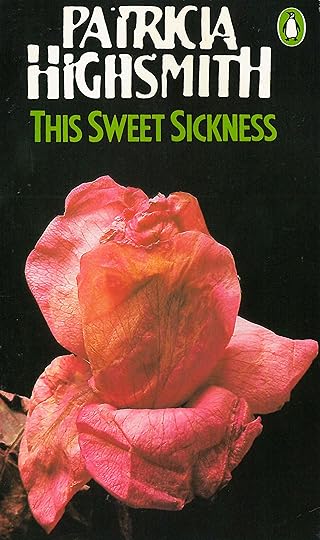
This Sweet Sickness by Patricia Highsmith
Patricia Highsmith is probably best known for Strangers on a Train, and The Talented Mr. Ripley, which were each turned into popular films. But, this hypnotic and strange story is every bit as brilliantly suspenseful as her better known works.
A man named David Kelsey is deeply, passionately in love with his girlfriend Annabelle. There are just a couple of problems: She is not in love with him anymore — at all. They haven’t actually been a couple for a long time. She is, in fact, happily married to another man, and has just given birth to a baby. But David doesn’t let this stop him — he has a goal to be with Annabelle, and he is not going to let anything get in the way of that, not even reality.
Highsmith was an avid student of abnormal psychology, and it shows here. This Sweet Sickness is so perfectly written, so tightly plotted, and so utterly compelling that when Highsmith disturbingly, convincingly takes her readers down the dark spiral of madness, we never once think of trying to break free. This is a killer psycho-thriller of the first order.
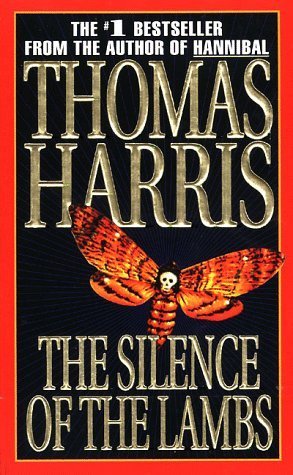
Silence of the Lambs by Thomas Harris
What thriller list would be complete without Silence of the Lambs? I debated between this and Red Dragon, Harris’s earlier work featuring Hannibal Lecter, but in keeping with my predilection for the ordinary girl in extraordinary circumstances, it had to be Silence.
Most people probably know the plot where newbie agent Clarice Starling is on her first big investigation, hunting a serial killer dubbed by the media as “Buffalo Bill.” In doing so, she must visit a maximum-security facility for the criminally insane to consult with former psychiatrist and perennial psychopath Hannibal Lecter. The book is absolute perfection in plotting and procedure, but for me as a reader and writer, character is king. It’s Harris’s deep diving into Clarice Starling and Hannibal Lecter, and his unspooling of their complicated and nuanced relationship, that really make this book a masterpiece.
The word “thriller” has, for some, a bad connotation. For these gentle readers, the word might indicate that a book will be too tense, too frightening, or too (gasp) lowbrow. They might demure, Oh I don’t read that kind of book, but a great story takes us into another universe, makes us feel something big, and engrosses us for a time in a life not our own. They thrill us, and I have found on my long literary journey that all the best stories are precisely those kinds of books.
February 12, 2014
Liar, Liar
I consider myself an honest person, but I occasionally lie. My daughter believes in Santa Claus and the Easter Bunny. While I didn’t tell those lies precisely, I have played along. Even today, I woke up thinking of a palatable lie I might tell a friend to avoid spending time with him and his new girlfriend out of loyalty to his ex-wife who is also my friend. There are a hundred things that I don’t say, or gloss over to keep the peace in relationships. Is keeping silent the same as lying? When it comes to lying, I have a lot of questions.
Most of my novels, are in one way or another, my way of answering the queries I have about human nature. I am most concerned with motive. I am far less interested in what people do than I am in why they did it. Why do some people cheat, steal, or murder to meet whatever dark agenda they might be running? Why do others willingly sacrifice themselves to protect, to defend, to help strangers? But I am especially fascinated with why people lie. Why do we lie to each other? Why do we lie to ourselves?
I have had a number of characters lie to me over the years. I start off thinking they are one thing only to learn, as the narrative progresses, that they are something else entirely. But Lana Granger, the main character of IN THE BLOOD is by far the most effective liar I have encountered. When we first met, I knew she was hiding something, maybe a few things. But the size and scope of her lies surprised even me. Of course, she had her reasons. Liars usually do.
While Lana might be the best, she’s not the first liar I have encountered. When Jones Cooper first showed up in Fragile, I didn’t think very much of him. He was just the husband of a significant character in the book. But as the story unfolded, I came to understand that his lies were central to the major events in the story. He, like Lana, had constructed an entire life around a falsehood that had its roots in his childhood. Everything he did in his life was, in one form or another, a penance for hiding the truth. And it was eating him alive inside.
Given the corrosive nature of lies, and how the act of lying and then lying again and again to protect the initial lie takes such a heavy emotional and psychological toll, wouldn’t it be easier to just tell the truth? I often look to myself for answers when pondering my characters. Take the situation with my friend, for instance. Wouldn’t it be simpler for me to just say: “Hey, look, as much as I love you, I just can’t get past the idea that hanging out with you and your girlfriend is a terrible act of disloyalty towards your ex-wife.” Otherwise, I will perpetually have to come up with excuse after excuse until the invitations cease out of anger, annoyance or just embarrassment.
But the truth hurts. For Lana, it is far harder to bear the facts of her life than to live a lie. Her falsehoods form a cocoon, and inside it she’s undergoing a metamorphosis. She’s growing and changing. She’s reaching a point where she might be able to push out through the layers of her chrysalis and emerge a new creature altogether. So, in that way, don’t her lies have some kind of redeeming value for Lana? Perhaps it is her psyche’s way of healing itself from the trauma of her past. Perhaps it was wise or even necessary for Lana to lie about herself. Maybe it was her right to be someone she wasn’t, just for a little while, until she was stronger. One of my other favorite questions: Is a lie always a bad thing?
Jones Cooper on the other hand is ruined by his lies. When the truth comes out, it costs him dearly. He is not healed by his time in hiding; he has only delayed facing the consequences of his actions. In fact, things would have been much easier if he had faced them earlier. He might have lived a different life altogether. Here’s another question: Is it better to face the truth even when you know the consequences will be dire?
Characters lie for all sorts of reasons. Lana lies to protect herself. Jones lies because he can’t face the truth that his actions reveal about him. Willow Graves, a teenager I met in Darkness, My Old Friend, lies because she wants people to think she’s cooler than she is, never realizing until too late how her falsehoods will spin out of control. Annie Powers, the troubled main character of Black Out, lies because she is hiding from someone who wishes her harm. But, for all the different motives my characters have for deception, there’s really only one reason. Fear. People lie because they are afraid of the truth.
Writing about my lying characters has convinced me that honesty is the best policy where my friend is concerned. But I’m still not sure what I’m going to do. It takes courage to speak an unpleasant truth. And I know this from bitter personal experience. There have been times when I have opted to say the absolute truth of my feelings. I have stood up against abuse, spoken out against bad behavior, left situations that were too unpleasant to endure simply for the sake of good relations, and offered honest responses to hard questions asked by friends. In some cases, when people were ready to hear the truth, things turned out all right. But mostly, they went badly. Huge battles followed, relationships were sundered or permanently maimed, and I still struggle with thinking that I should have just kept my mouth shut.
At the end of Beautiful Lies, Ridley Jones, a character who loses everything in the pursuit of the truth of her life says (and I really do hate to quote myself but it is my essay about why my characters lie): “Now Jake and I have a policy of total honesty between us. And that’s not always easy (as in, “Do these jeans make me look fat?”), but it’s always real. And I’ll take real any day over lies, no matter how they glimmer and shine, no matter how beautiful.” Of course, the irony there is that Ridley is still being lied to at the end of that book. She just doesn’t know it yet. Here’s another question: Is a lie still a lie, even if you never know the truth?
Does my fictional universe in some way reflect how I perceive the world at large, populated by liars, a place where nothing is as it seems? I wouldn’t go that far. I don’t lie in any significant ways, nor do most of the people in my inner circle. But I will say that I think there are myriad shades of truth in most encounters, layers of self that are revealed or concealed. The laying bare of the soul is a frightening act of intimacy; most of my characters don’t have the courage for it at the beginning of my novels. Some do by the end. Maybe that’s the point, that they all walk the road from lies to the truth. And for most of them, there’s redemption in the journey.
January 19, 2014
Key West Literary Seminar
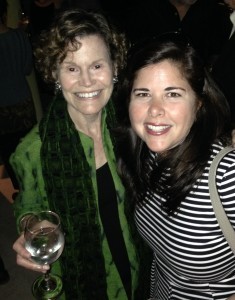
Judy Blume and Lisa Unger
Lee Child and Lisa Unger
January 11, 2014
Oxford Exchange Book Party





January 10, 2014
An Evening with Michael Connelly and Lisa Unger
And the weather even cleared up, creating a beautiful sunset on Clearwater Beach, FL for our sweepstakes winners, Carol & Bob Bro from St. Louis!
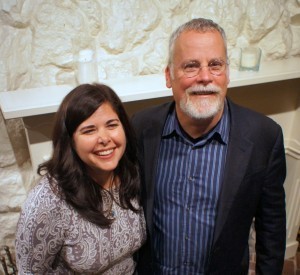
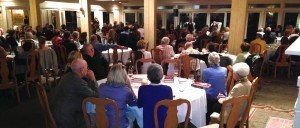
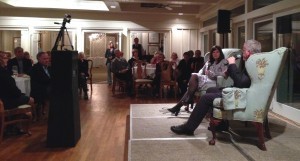

January 7, 2014
CBS Studio 10 Interview

January 3, 2014
IN THE BLOOD is an AMAZON Editors' Pick
